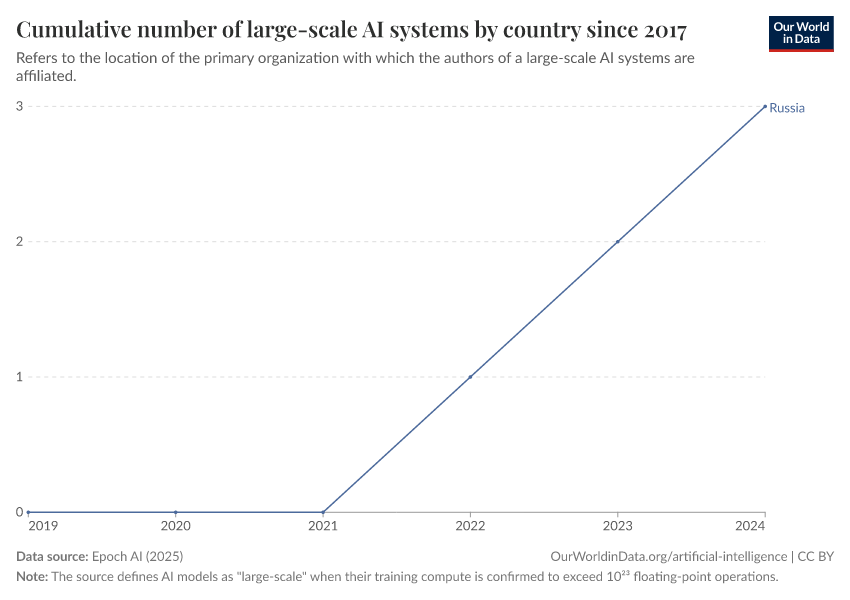Cumulative number of large-scale AI systems by country since 2017

About this data
About this data
Sources and processing
This data is based on the following sources
How we process data at Our World in Data
All data and visualizations on Our World in Data rely on data sourced from one or several original data providers. Preparing this original data involves several processing steps. Depending on the data, this can include standardizing country names and world region definitions, converting units, calculating derived indicators such as per capita measures, as well as adding or adapting metadata such as the name or the description given to an indicator.
At the link below you can find a detailed description of the structure of our data pipeline, including links to all the code used to prepare data across Our World in Data.
Notes on our processing step for this indicator
The number of large-scale AI systems by country is determined by tallying the number of machine learning models that are associated with the geographical location of the researchers' affiliated institutions. It's important to note that a single model can have multiple authors, each potentially affiliated with different institutions, thus contributing to the count for multiple countries.
Reuse this work
- All data produced by third-party providers and made available by Our World in Data are subject to the license terms from the original providers. Our work would not be possible without the data providers we rely on, so we ask you to always cite them appropriately (see below). This is crucial to allow data providers to continue doing their work, enhancing, maintaining and updating valuable data.
- All data, visualizations, and code produced by Our World in Data are completely open access under the Creative Commons BY license. You have the permission to use, distribute, and reproduce these in any medium, provided the source and authors are credited.
Citations
How to cite this page
To cite this page overall, including any descriptions, FAQs or explanations of the data authored by Our World in Data, please use the following citation:
“Data Page: Cumulative number of large-scale AI systems by country since 2017”, part of the following publication: Charlie Giattino, Edouard Mathieu, Veronika Samborska, and Max Roser (2023) - “Artificial Intelligence”. Data adapted from Epoch AI. Retrieved from https://archive.ourworldindata.org/20260126-094752/grapher/cumulative-number-of-large-scale-ai-systems-by-country.html [online resource] (archived on January 26, 2026).How to cite this data
In-line citationIf you have limited space (e.g. in data visualizations), you can use this abbreviated in-line citation:
Epoch AI (2025) – with major processing by Our World in DataFull citation
Epoch AI (2025) – with major processing by Our World in Data. “Cumulative number of large-scale AI systems by country since 2017” [dataset]. Epoch AI, “Tracking Compute-Intensive AI Models” [original data]. Retrieved February 21, 2026 from https://archive.ourworldindata.org/20260126-094752/grapher/cumulative-number-of-large-scale-ai-systems-by-country.html (archived on January 26, 2026).